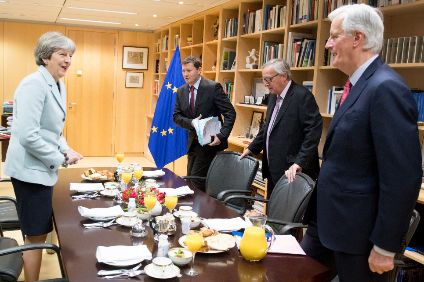
A vote last night by representatives in the UK's lawmaking chamber, the House of Commons, on a proposed UK-EU Brexit deal has fueled uncertainty over trade and other arrangements between the UK and EU when the UK is scheduled to leave the EU on 29th March.
The representatives voted heavily to reject the government's proposed exit deal – negotiated by prime minister Theresa May's government and the EU – on the terms of the UK's departure from the trade bloc. The deal included a 21-month transition period in which the UK would have stayed in the EU's customs union while a permanent trade deal was negotiated. Completely frictionless UK-EU trade – which applies currently in accordance with the UK's full EU membership status – was not guaranteed in the transition, but it was widely thought any additional border checks in the transition period would be minimal.

Discover B2B Marketing That Performs
Combine business intelligence and editorial excellence to reach engaged professionals across 36 leading media platforms.
Business representatives in Britain – including in the automotive sector which trades heavily across the UK-EU border in pan-European supply chains – were widely in favour of the proposed deal and are today expressing concern over the unclear political situation in London and the consequential uncertainties surrounding Brexit.
Multiple scenarios are being speculated today, including a new compromise/consensus deal that is based on the current proposal but comes with amendments (although it is unclear what they would be or how the consensus in parliament would form) for another lawmakers' vote. Other possibilities include a further national referendum to break the logjam (the question asked on the ballot paper would itself be very controversial) or a so-called 'no-deal' or 'managed' Brexit – which in trade terms would mean the UK immediately reverting to WTO rules (and new tariffs applying to UK-EU trade, including automotive).
One problem is parliamentary arithmetic which makes achieving a consensus solution rather problematic. Mrs May's governing Conservative Party is the largest party in the House of Commons, but governs in a minority with the help of a small party (the DUP) from Northern Ireland. The opposition to the current deal was made up of opposition MPs – led by the largest party, Labour – but also comprising over a hundred of the governing Conservative Party's own MPs (a mixture of EU 'Remainers' and 'Leavers' – opposed to the deal for very different reasons).
The government faces a 'no confidence' motion this evening that could lead to a General Election. However, the so-called 'rebels' in the Conservative Party are expected to come back into the fold and ensure that the government stays in place (just, with the help of the DUP). What happens after that remains fairly unclear and much depends on behind-the-scenes probing to see if and how the parliamentary arithmetic can be swung in favour of another proposal. As Brussels is making clear though, time is short – which may mean that an extension to Article 50, which stipulates that the UK departs the EU on March 29 has to be considered.
There is sure to be much concern in the UK's automotive industry – and indeed across Europe – today. Mike Hawes, SMMT Chief Executive said: "The vote against the Brexit deal on the table brings us closer to the 'no deal' cliff edge that would be catastrophic for the automotive industry. All sides in parliament must work together to find a way forward and put the necessary mechanisms in place to prevent this happening and explore alternatives that protect our future.
"Leaving the EU, our biggest and most important trading partner, without a deal and without a transition period to cushion the blow would put this sector and jobs at immediate risk. 'No deal' must be avoided at all costs. Business needs certainty so we now need politicians to do everything to prevent irreversible damage to this vital sector."






